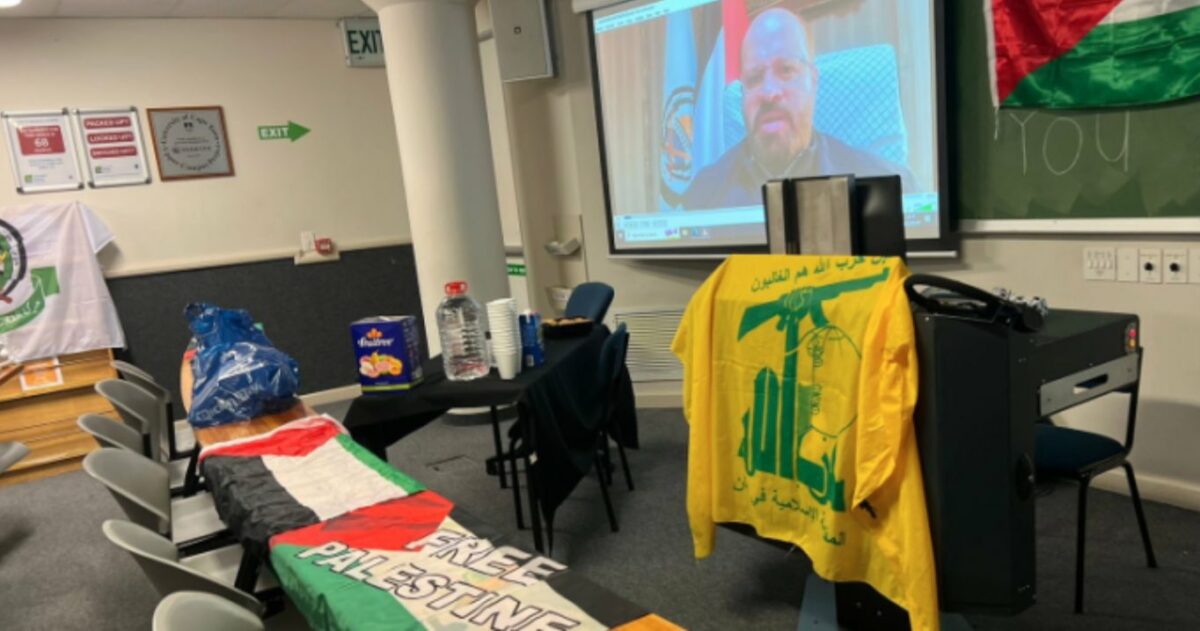Representatives of Hamas and Palestinian Islamic Jihad (PIJ) addressed students at University of Cape Town (UCT) via video message during an “Israeli Apartheid Week 2023” event held on Monday by the Palestine Solidarity Forum (PSF).
Images of the event, as well as advertisements for it, were obtained by The Algemeiner. PIJ representative Nasser Abu Sharif and Hamas representative Khaled Qadomi, both of whom represent their organizations in Iran, gave remarks. PSF group also displayed the flags of Hamas and Hezbollah in the room where the event took place.
Hamas and PIJ both are listed are designated as terrorist organizations by Australia, Canada, the European Union, Israel, Japan, the United Kingdom, and the United States.
University of Cape Town has been asked to comment on this story. It will be updated accordingly.
An unabashed partisan of the Iranian regime, Abu Sharif has for years suggested that Israelis would be expelled from Israel should Palestinians achieve “complete victory.” In 2014, he told an Iranian news outlet that “Palestine does not have room for the two sides,” adding that “either the Palestinians or the Israelis must reside in it.” He also, according to a summary of remarks provided by Tehran Times, in 2021, has denounced the efforts of Israel and Arab states to normalize diplomatic relations and foster peace in the Middle East, describing them as “dangerous.” In 2020, shortly after the announcement of the historic Abraham Accords he called the United Arab Emirates “a tool of Zionism in the region.”
Khaled Qadomi does not recognize any Jewish ties to the land of Israel, having argued adamantly that it is a “neocolonial project” that was “created by the assistance and the strategies of western powers in our region.” He advocates ongoing acts of terror against the Israeli state and people, comparing them to guerilla warfare tactics used against the United States during the War in Vietnam.
On Monday, the South African Zionist Federation (SAZF) spokesperson Rolene Marks told The Algemeiner that the event was “shameless” and promoted extremism.
“Our universities should be places of rational debate and inclusive engagement, not hostile environments which encourage the dissemination of propaganda from extremist organizations such as Hamas,” Marks said. “Places of learning in South Africa must be clear on the dangers of incitement hosting speakers who would call for the discrimination, annihilation, and destruction of Jewish people, as a result of their race.”
Marks added that SAZF “condemns the PSF for encouraging the discriminatory, racist, and extremist political ideologies of Hamas and the oppressive regime of Iran on South African campuses” and called on the university to join it.
“We are left to our own destiny,” he said during an interview in February. “We must defend ourselves with whatever available means…Hence the strategy is very clear; to achieve the liberation of Palestine from the River to the Sea, that is with the available means.”
PSF has previously conducted anti-Zionist activity on campus. In 2019, it worked with the Boycott, Sanctions, Divestment–South African Coalition (SABDS) to cancel presentations by two Israeli professors at an academic conference co-hosted by the University of California-Berkeley and UCT. In a statement posted on Twitter, PSF said it also sent UCT and the Berkeley Center an ultimatum calling for the professors to “clarify … their position on Palestine,” or otherwise for the conference to rescind the scholars’ invitations and invite Palestinian academics.
Past efforts to boycott ties to Israeli academics at the University of Cape Town have been strongly opposed. In November 2019, 68 percent of the 363 members of the UCT Senate voted down a resolution proposing that the school “not enter any formal relationships with Israeli academic institutions operating in the Occupied Palestinian Territories as well as other Israeli academic institutions enabling gross human rights violations in the Occupied Palestinian Territories.”
Two years prior, a petition calling on the school to “stand against” a boycott of Israel drew over 69,00 signatures, arguing that boycotts violate principles of academic freedom and freedom of speech.
Despite numerous defeats of BDS on campus, other events in South Africa have prompted fear among the South African Jewish community that antisemitism is rising.
Earlier this month, the Parliament of South Africa voted to reclassify the country’s embassy in Tel Aviv as a liaison office, which represents a significant downgrade in Israel and South Africa’s diplomatic relations.
South African Zionist Federation said the measure “created a foreign policy that aims to befriend dictatorships and bash democracies.”
First published by The Algemeiner.

